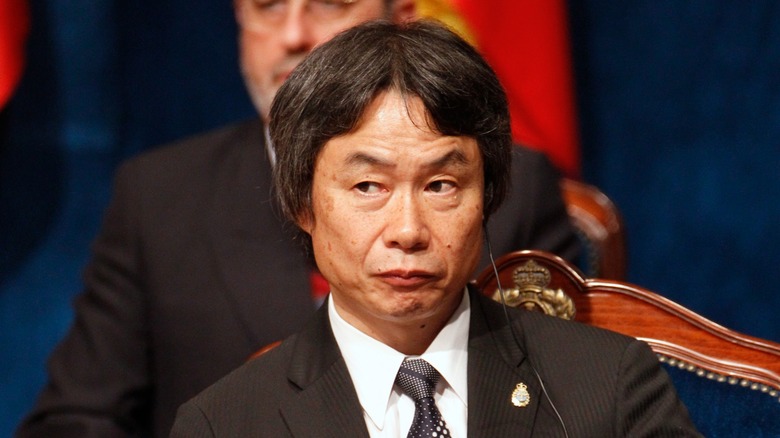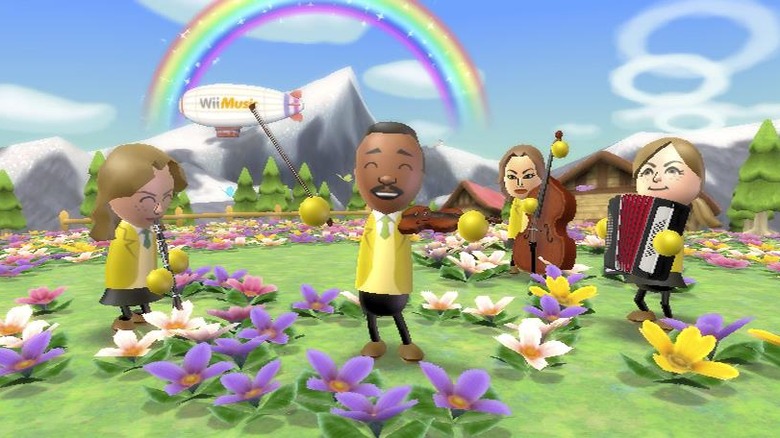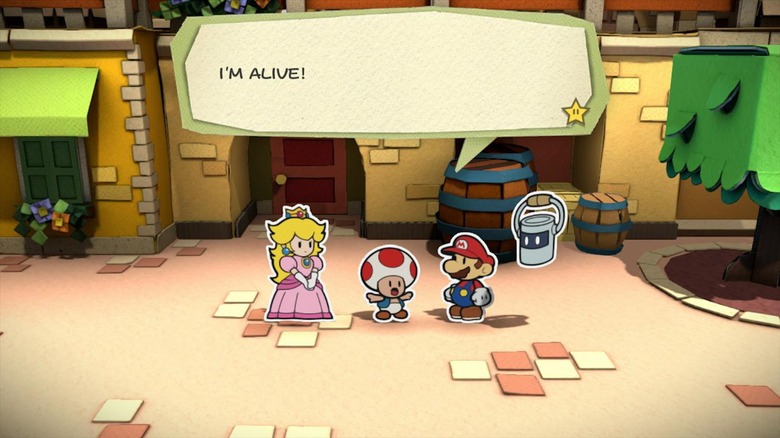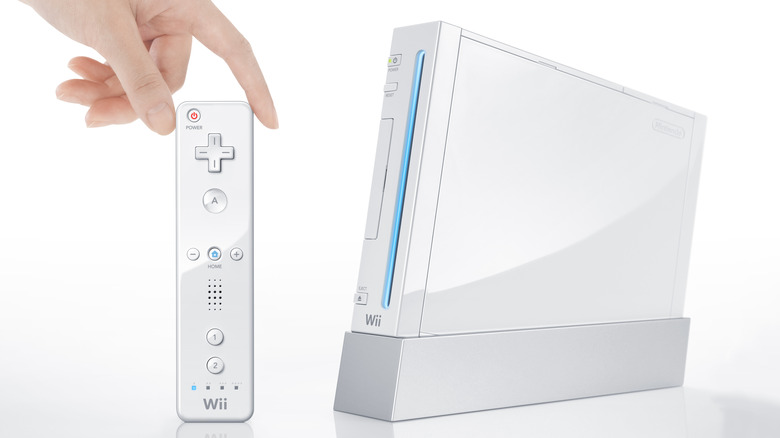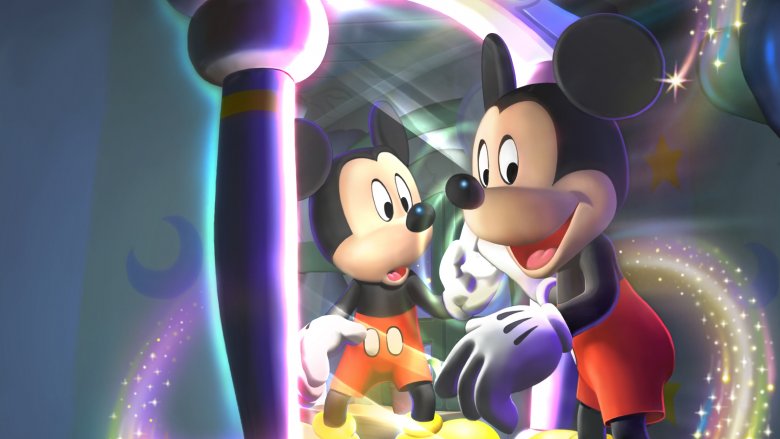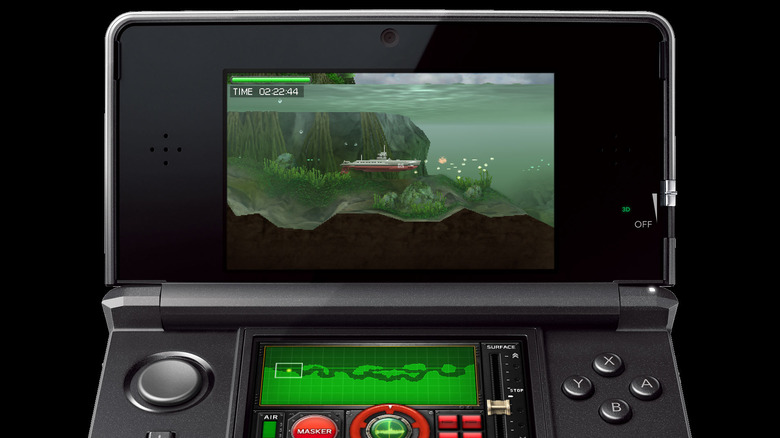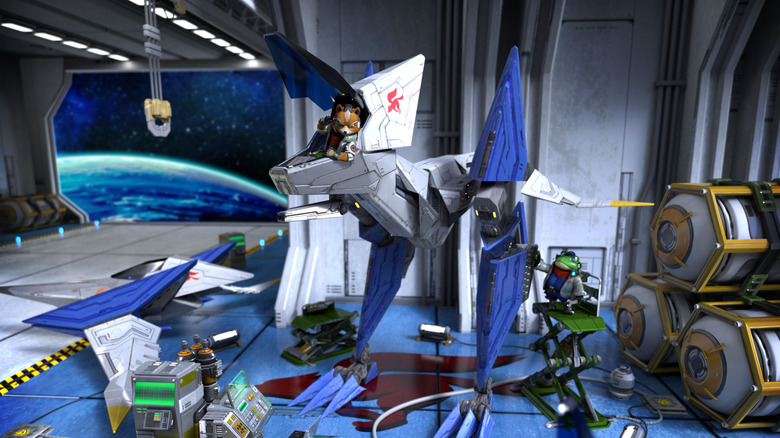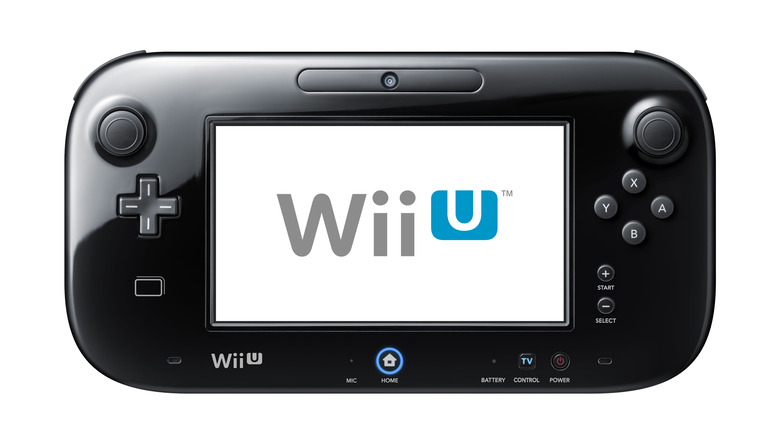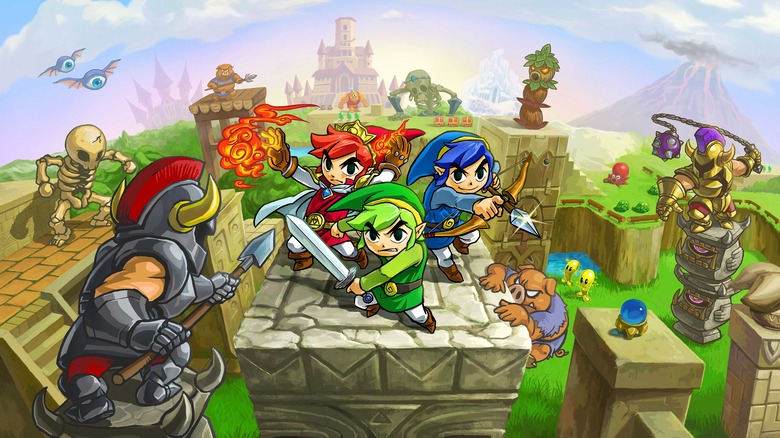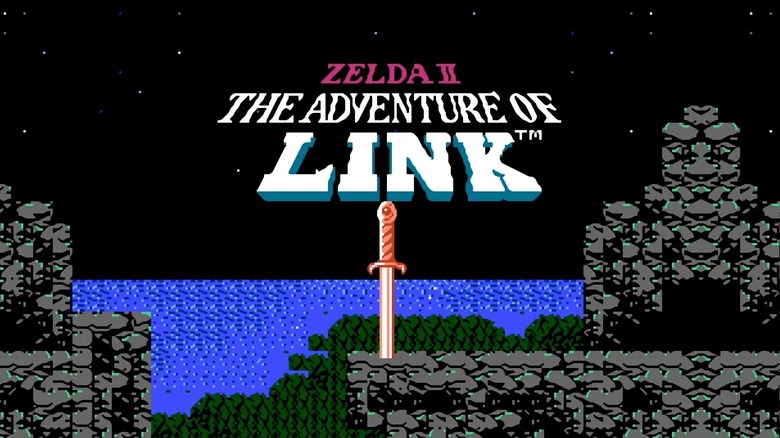Shigeru Miyamoto's Biggest Mistakes
If there's one man in the video game industry who is the undisputed face of his company, it's Shigeru Miyamoto. Since joining Nintendo all the way back in 1977, Miyamoto has built an entire career around creating fun and novel games. He's the mind behind titles like Super Mario Bros., Donkey Kong, The Legend of Zelda, and more. And it's tough to argue that most of the aforementioned characters aren't household names.
Miyamoto has a stellar track record in game design, direction, and production. But not everything has gone according to plan. Or, as Nintendo's late president Satoru Iwata stated, Miyamoto is "not God" and "cannot hit the mark every time."
The truth is, for the large number of successes Miyamoto has to his name, there are a number of business decisions he's made and games he's helped steer that haven't been nearly as well received. They're tough to track down, especially when someone has a career of triumphs like Miyamoto's. But they do exist, and below, we'll shine a light on some of them.
Wii Music fell flat
The Wii brought a lot of new and innovating concepts to gaming, and it's hard to dispute that the console made the act of playing video games a much more casual affair. Games like Wii Sports deserve a lot of credit for showing off what the system could do, melding software and hardware to create an experience people wanted to take part in.
During the Wii's heyday, though, another peripheral revolution was taking place. It involved plastic guitars, drums, and a couple of friends with rhythm. We're talking, of course, about the era when Rock Band and Guitar Hero ruled music games.
Shigeru Miyamoto's Wii Music was meant to be Nintendo's take on those titles. Though not as objective based — the game didn't score players for hitting the right notes — it still encouraged Wii gamers to pick up a Wiimote, play an "instrument," and jam out.
Miyamoto thought the game had great promise. Unfortunately, gamers didn't feel the same.
Wii Music is one of the least successful Wii games ever created by Nintendo. Reviews were tough, with one writer saying that "most adults will quickly recognize that Wii Music is little more than a noise maker tied to a series of gestures and grow bored of the experience in a matter of hours, if not minutes."
Paper Mario started telling paper-thin stories
Mario's first RPG outing first happened in 1996 with Super Mario RPG, a game released on Nintendo's 16-bit home console, the Super Nintendo. Super Mario RPG became an instant classic, and fans made it abundantly clear: they wanted more RPGs featuring Mario. So when Nintendo decided to once again place its mustached plumber into a role-playing game — and Paper Mario for the Nintendo 64 received rave reviews — it seemed clear that Nintendo had a certifiable hit concept on its hands.
Going forward, the Paper Mario series became the home for all things Mario and RPG. The GameCube got Paper Mario: The Thousand-Year Door in 2004, and Nintendo followed that up with Super Paper Mario for the Wii in 2007. Both were reviewed favorably, which makes it astonishing that Nintendo departed so heavily from one of the things fans loved about the series — its storytelling — in 2012's Paper Mario: Sticker Star.
As it turns out, the shift was Shigeru Miyamoto's idea. According to a member of the Sticker Star team, Miyamoto insisted on several changes to the Paper Mario formula when Sticker Star was in production. "Aside from wanting us to change the atmosphere a lot, there were two main things that Miyamoto-san said from the start of the project: 'It's fine without a story, so do we really need one?' and 'As much as possible, complete it with only characters from the Super Mario world,'" said Kensuke Tanabe, the game's producer.
The result? A less interesting game, with one critic writing, "Paper Mario: Sticker Star traded in the diverse cast and goofy narrative for a bland, repetitive collect-a-thon."
The Wii missed the high def train
The Nintendo Wii first launched in November 2006, one year after the Xbox 360 and right alongside the PlayStation 3. And most gamers didn't even need to turn a TV on to see that the Wii was going to be vastly different than those other consoles. Instead of using a more traditional control scheme, the Wii bet the farm on Wiimotes and motion controls. And for its exercise in experimentation, Nintendo was richly rewarded by gamers over the life of the Wii, selling over 100 million units.
In spite of the success, however, Shigeru Miyamoto still feels that he and Nintendo could have done things differently.
You see, the Wii was built by people who believed high-definition gaming was several years away. But HD came a lot sooner than that. And while the Xbox 360 and PlayStation 3 were ready, the Wii was not.
"I felt like I wanted to go to HD sooner," Miyamoto said in an interview. "Even for the Wii, no matter how much it made the system cost, it would have been great if it were HD in the first place."
The lack of HD didn't hurt Wii sales by any stretch. What it did hurt was Nintendo's ability to adapt to the HD gaming landscape with its next console, the Wii U, as several games slated for that system's launch had to be delayed due to hiccups in the transition from standard definition to high-def.
Disney's Magical Mirror Starring Mickey Mouse lacked magic
Combining Mario creator Shigeru Miyamoto with a character like Mickey Mouse doesn't sound like something that could actually happen. It sounds more like a sort of fantasy game developer draft, where you'd choose the talent you'd most like to handle a licensed game. But believe it or not, Miyamoto and Mickey did indeed join forces, and the result was 2002's Disney's Magical Mirror Starring Mickey Mouse. It's a mouthful of a title, and unfortunately, all of the alliteration couldn't keep it from being a disappointment.
Miyamoto and Mickey met up to a middling Metacritic metric, with Magical Mirror receiving mediocre marks for its monotonous mechanics and mundane story. It wound up being a rare miss for Miyamoto, who served as the game's lead producer. But it can be a reminder to gamers that not everything he touches turns to gold. Miyamoto has a long list of titles he's helped put on "Best Games of All Time" lists, but he couldn't get Disney's biggest property to the promised land.
Steel Diver sunk
Shigeru Miyamoto isn't afraid to try new and different things, and in 2011's Steel Diver, he and Nintendo took a shot at creating a sim game centered around controlling a submarine. Such a title might seem strange on a home console, but on Nintendo's 3DS handheld, the idea paired with the portable's touchscreen seemed at first like it could work.
But even Miyamoto seemed to acknowledge in interviews that he thought the game would be fun not necessarily because of the gameplay, but because of the hardware it was on, stating in an Iwata Asks video, "It always has been a very plain game. (laughs) But it was a matter of how we could present this plain game in the best possible way. We came to the conclusion that it would look great in 3D."
He was right.
Steel Diver didn't glide gracefully like a submarine — it sank like a rock. Reviewers criticized the game for its lack of direction, claiming that it never seemed sure of what exactly it wanted to be. One writer put it this way: "Steel Diver never figures out if it wants to be a submarine simulation or an action romp, and that indecision leads to a yawn-inducing experience." It seems Steel Diver could have used less focus on looking neat in 3D and more focus on the gameplay.
Star Fox Zero didn't add up
Back when the Wii U was still around and sorely lacking in games to play, the promise of a new Star Fox game seemed like the perfect remedy. The franchise really took off with Star Fox 64 for the Nintendo 64, and though Star Fox Adventures on the GameCube isn't as well remembered as the N64 classic, there were still fans of the space-faring Fox looking forward to a new installment in the series. That entry would become Star Fox Zero, and given that Shigeru Miyamoto was signed onto the project as lead producer and supervising director — the first director credit he'd had since Super Mario 64 — fans assumed the title would be in good hands.
It wasn't.
The main fault came with the controls. Miyamoto insisted on having Star Fox Zero use the Wii U's GamePad for motion controls in certain areas, essentially shoehorning dual-screen gameplay into Zero in a way that felt uncomfortable. And reviewers felt that Nintendo's over-reliance on the GamePad's features ultimately hampered the game in ways that made it not fun to play. Star Fox Zero wound up being less of a Star Fox game and more of a tech demo for a console that was on its way out, and Miyamoto has a share of the blame for its poor reception.
The Wii U GamePad didn't change the game
When the Wii U was first unveiled, Miyamoto and Nintendo appeared as though they had a brand new trick up their sleeves. The system wasn't based around motion controlled gaming like its predecessor, the Wii. Instead, the Wii U focused on a second-screen experience powered by a device the company called the GamePad. It was a lot like the company's take on handhelds — the dual-screen DS line — but adapted for a home console. And had it come a few years earlier, it could have been truly revolutionary.
Unfortunately, another man who made his name on calling things "revolutionary" beat Nintendo to the punch. About two-and-a-half years earlier in 2010, Steve Jobs and Apple introduced the iPad to the world, wowing the tech press and setting the standard for what a tablet should be. By the time Nintendo launched the Wii U in 2012, the GamePad looked less like an innovative controller and more like a copycat move.
In an interview, Miyamoto chalked the GamePad's poor reception up to bad timing. "I think unfortunately what ended up happening was that tablets themselves appeared in the marketplace and evolved very, very rapidly, and unfortunately the Wii [U] system launched at a time where the uniqueness of those features were perhaps not as strong as they were when we had first begun developing them," he said.
The Legend of Zelda: Tri Force Heroes didn't try hard enough
The Legend of Zelda: Tri Force Heroes broke the mold for Zelda titles when it arrived on the Nintendo 3DS in 2015. Instead of sticking solely to a single-player experience, Tri Force Heroes relied heavily on cooperative gameplay in order to progress — quite the change for those familiar with the series. And seeing as Shigeru Miyamoto was the creator of the Zelda franchise, it should surprise no one that he had a hand in overseeing the development of the game, even taking part in play sessions with the development team to ensure it met his fun standards.
Unfortunately, what Miyamoto found fun didn't quite strike the same chord with critics.
Tri Force Heroes is mostly viewed as a "shallow" entry into the Legend of Zelda series, with critics writing that "there's not much depth here, and the facade fades with time." It's disappointing for sure, as a Zelda game that you can play with a friend sounds like it could have been something great had it gone in the right direction. Unfortunately, it seems Tri Force Heroes didn't take the idea far enough to be worthwhile.
Zelda II: The Adventure of Link wasn't legendary
Shigeru Miyamoto doesn't cop to failure much when it comes to games, and based on his track record, can you blame him? The vast majority of the titles he's associated with turn out great, and the franchises he's most closely tied to (Mario, The Legend of Zelda) routinely obtain high scores.
But there is one game that Miyamoto admitted he'd like to go back and change. And quite shockingly, it's a Zelda game.
Zelda II: The Adventure of Link released in 1987 and counts series creator Shigeru Miyamoto as its producer. And in an interview with Kotaku in 2013, Miyamoto seemed to admit that Zelda II wasn't everything he wanted it to be.
"When we're designing games, we have our plan for what we're going to design but in our process it evolves and grows from there," Miyamoto told reporter Stephen Totilo. "In Zelda II: The Adventure of Link, unfortunately all we ended up creating was what we had originally planned on paper."
It's a rare peek into the mind of the Nintendo legend, showing that even though he's made a lot of great games, the ones he views as underachieving still weigh on him — even 26 years later.

